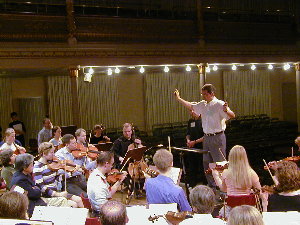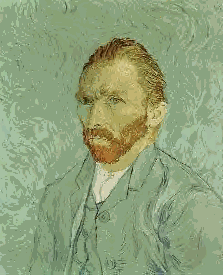Leadership Through Music
Stockholm, Sweden
April 21-22, 2002
Leadership and the Metaphor of Music
In the era of globalization we have searched frantically to understand
the qualities of effective leadership. There is a belief that if we can
become better leaders, we can run more successful companies. More books
are written on the characteristics of successful leadership that almost
any other topic, except perhaps love.
Developing your ability as a leader is a journey out to the world
around you to understand what is changing. It is also about a journey
inside yourself to know more about your values, fears, joys, strengths and
limitations. In new and uncertain situations it is important to remember
that we each have inside, of ourselves, what we need to succeed. The
challenge in life is to recognize this and to know how to draw on it when
circumstances change. The self is the instrument in the performance of leadership. Learning
about ourselves is the first step in this process. Learning from others in
a process that allows for the sharing of different perspectives and
experiences is important. Learning from leaders in other disciplines
besides business is immensely valuable. Leadership is primarily about the
interaction between people and as such, lessons can be found wherever
there are people who lead and people who follow. Lessons from Music for the Leader Today The world of music has delivered many examples of leadership and of
people working together to create great things in times of change. As such
it is a valuable metaphor for the individual today to use in understanding
his or her leadership personality. Music and business are both global forces that transcend different
languages and geography. Executives or musicians must each find ways to
create and innovate to use new technologies, to deal with change and to
utilize efficiently the resources they have available to them. Both seek
to create value and must compete to succeed. It is these similarities that
enable one to learn by watching the ways of the other. Indeed, music and
musicians offer insights for anyone to learn more about themselves how
well they listen, communicate and cooperate with others, use their
imagination, create or solve problems. Music is a lens through which we can visit another time or place. The
music of Europe through its form and style can tell us much more than
history books about the people of that time and the society and economy in
which they lived. Music also communicates much about the culture of the
region or nation from which it comes. Becoming a leader is a lifelong journey one makes to a greater degree
of self-awareness and interpersonal skill. It is about
"understanding" and "connecting" with others and
moving them forward to new places. Good leadership is not a constant state
it is a moment in time when someone steps forward and says, "follow
me this way". It is a moment that one has prepared for with all of
lifes experiences and it is a circumstance that requires a particular
person in a particular context. After the moment has passed, the leader
may just as quickly step back and be lead by others. The moment of
leadership is as dependent on the circumstances and context as it is on
the ability and energy of the individual who chooses to lead.
Becoming a leader is a lifelong journey one makes to a greater degree
of self-awareness and interpersonal skill. It is about
"understanding" and "connecting" with others and
moving them forward to new places. Good leadership is not a constant state
it is a moment in time when someone steps forward and says, "follow
me this way". It is a moment that one has prepared for with all of
lifes experiences and it is a circumstance that requires a particular
person in a particular context. After the moment has passed, the leader
may just as quickly step back and be lead by others. The moment of
leadership is as dependent on the circumstances and context as it is on
the ability and energy of the individual who chooses to lead.
| What can music tell us about our world today? What insights does it offer for understanding the changes taking place around us? | |
| Can music help us to know where we are headed? | |
| How can music teach greater self-understanding and build our confidence in ourselves? |
The Self as Instrument
Before stepping forward, a leader must first consider for himself where he stands and what are the goals he wishes to reach. Becoming truly effective at this is an inward journey of self-discovery. Musicians and composers have this journey as their prime responsibility, their prime wish and prime gift.
A musician must also be able to hear himself in order to move his performance to greatness. It is not sufficient to play the notes the right way and to get the timing right. He must envision what he wants to sound like and then really listen to himself step outside his performance and look back at what he sees and hears. Great performers realize the importance of being able to visualize themselves as they perform.
If one envisions the performance to be mournful and sad it will be. If one envisions it to be energized and optimistic it will be. Musicians and other performers have the advantage of being reminded daily that they must perform for others in order to communicate. Most people in business have forgotten that this applies to them as well.
| How do you want to be seen and heard? |
| What is your dream for how your performance should be and how you would perform at your best in it? |
Consider the artist Vincent Van Gogh. Why is it that he painted so many self portraits? Compared to Gaugin or the other artists of that time who painted landscapes or people, Van Gogh was consumed with his room, his vase, his house, and his face. Why?
 Perhaps
it was because Van Gogh was so deeply connected to himself. So much so
that many people believed he was insane. He was consumed by his moods, his
love for Gaugin, his relationships, the night and being alone. He knew the
inside of himself all too well. The self-portrait was his way of stepping
outside what he lived with every day and looking back in. Could he portray
this face of a man the way he wished the world would see him? Was he
searching for the person that the rest of the world saw while deep
inside he saw a different view of himself?
Perhaps
it was because Van Gogh was so deeply connected to himself. So much so
that many people believed he was insane. He was consumed by his moods, his
love for Gaugin, his relationships, the night and being alone. He knew the
inside of himself all too well. The self-portrait was his way of stepping
outside what he lived with every day and looking back in. Could he portray
this face of a man the way he wished the world would see him? Was he
searching for the person that the rest of the world saw while deep
inside he saw a different view of himself?
Artists connect with the side of themselves that most of us do not have time to know. They live balanced between inhibition and conformity and between the secrets and emotions we dare not consider in ourselves and the energized optimism of discovering how glorious life can be. The great artist draws on this to create. He walks the line between the world of controlled progress and the other side being a state of insanity of unchecked emotion.
Leadership is as much about a journey inside ourselves as it is about a journey out to the world to understand how it is changing. How do leaders in the global marketplace today make time for this journey inside themselves. If we are to fashion a better world, a better firm and a meaningful role for business in the future can we do this without understanding first where we stand as individuals and what we envision ourselves to be as leaders of this progress?
The Performance
The other theme of Leadership Through Music is a more visible one than the theme of the Self. It is the skill of getting other people motivated, getting them to where they need to go by providing a process where the leader clearly shows them the way while also letting them find it on their own. The realities of this are influenced by the individuals you are leading, what sort of people they are, what goals or ideas they have and how they feel about you as the leader.
The skillful and effective leader learns how to transmit what is inside himself outward to others while perceiving intensely and clearly what is around him and incorporating that back into action.
Effective communication is the key to success in this process. Communication is made up of many qualities: speaking, observing, sensing, understanding and most importantly listening.
More Information: